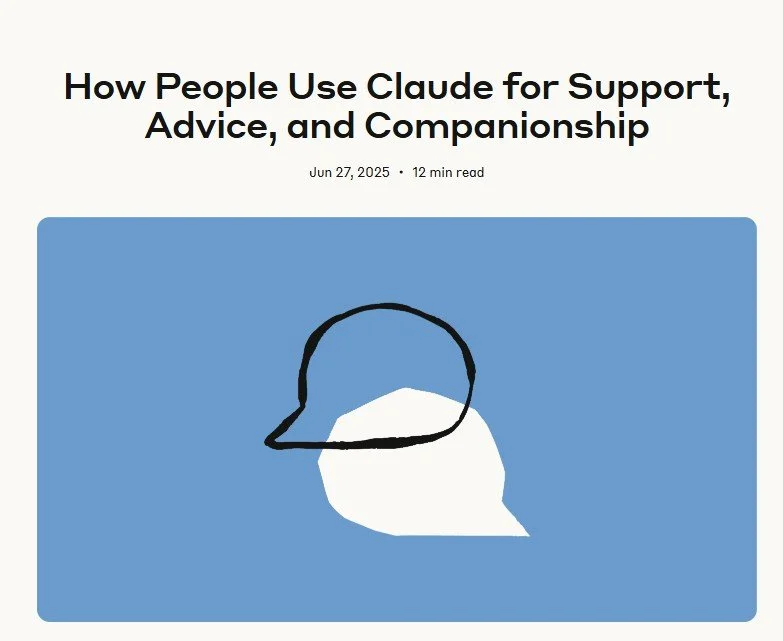GHFC Research Brief: What Anthropic's Study on Emotional AI Use Means for Higher Ed
By Claire Brady, EdD
“The goal isn't to prevent all emotional AI use, but to ensure it enhances rather than substitutes for the human relationships that remain central to student success and well-being.”
Anthropic released fascinating research on how people use Claude for emotional support, advice, and companionship—and the findings have significant implications for higher education leaders. As AI tools become more sophisticated and accessible on our campuses, understanding their emotional dimensions isn't just interesting—it's essential for creating policies that protect student well-being while embracing AI's potential.
The Numbers Tell a Story
Out of 4.5 million conversations analyzed, only 2.9% involved what researchers call "affective" interactions—people seeking emotional support, coaching, advice, or companionship from AI. That's a small but meaningful slice that aligns with similar research from OpenAI and MIT. Even more telling: less than 0.1% of conversations involved romantic or sexual roleplay, suggesting most people aren't using general-purpose AI for inappropriate relationships.
For higher ed leaders, this data provides crucial context. The moral panic about students forming unhealthy attachments to AI chatbots may be overblown—at least for now. Most students are using these tools for academic tasks, not emotional replacement of human connection.
What Students Are Actually Discussing
When students do turn to AI for emotional support, the topics are surprisingly familiar to anyone working in student affairs: career transitions, relationship navigation, academic stress, and existential questions about purpose and meaning. The research found that people seek AI help for both practical concerns (job search strategies) and deeper challenges (persistent loneliness, workplace anxiety).
Perhaps most relevant for our work: counseling conversations revealed AI serving dual purposes—helping mental health professionals with documentation and assessment tasks, while also supporting individuals working through personal struggles. This suggests AI could augment, not replace, campus counseling services.
The "Endless Empathy" Question
Here's where it gets interesting for student development: Claude rarely pushes back in supportive conversations (less than 10% of the time), and when it does, it's typically for safety reasons—refusing dangerous weight loss advice or intervening when users express self-harm intentions. This "endless empathy" approach has both benefits and risks.
On the positive side, students can discuss sensitive topics without fear of judgment. On the concerning side, they might become accustomed to unconditional support that human relationships rarely provide. The research found that conversations typically end more positively than they began, suggesting AI doesn't reinforce negative patterns—but longer-term emotional dependency remains a critical unknown.
Actionable Strategies for Campus Leaders
Develop Nuanced AI Policies: Move beyond blanket restrictions to guidelines that acknowledge AI's potential supportive role while establishing clear boundaries about when human intervention is needed.
Train Student Affairs Staff: Help counselors, advisors, and residence life staff understand how students might be using AI for emotional support—and when to step in with human connection.
Create AI Literacy Programs: Educate students about the difference between AI support and human relationships, helping them use these tools strategically without developing unhealthy dependencies.
Partner with Mental Health Experts: Following Anthropic's collaboration with crisis support organizations, consider how AI tools on your campus can appropriately direct students to professional resources when needed.
Monitor Campus Climate: As AI capabilities expand and voice/video interactions become common, be prepared for evolving patterns of emotional engagement that may require updated approaches.
The Bottom Line
AI isn't replacing human connection on our campuses—yet. But as these tools become more sophisticated and emotionally responsive, higher education leaders must proactively shape how they're integrated into student support systems. The goal isn't to prevent all emotional AI use, but to ensure it enhances rather than substitutes for the human relationships that remain central to student success and well-being.
The future of AI in higher education isn't just about academic efficiency—it's about understanding how these tools affect the whole student experience.
Read the full report: https://www.anthropic.com/news/how-people-use-claude-for-support-advice-and-companionship
Image from the article: https://www.anthropic.com/news/how-people-use-claude-for-support-advice-and-companionship

